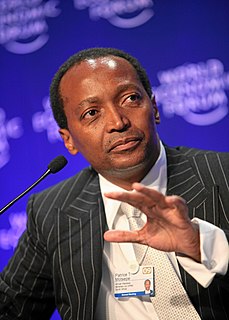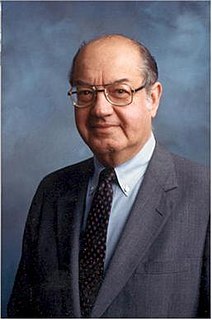Top 523 Coping Mechanisms Quotes & Sayings - Page 9
Explore popular Coping Mechanisms quotes.
Last updated on April 20, 2025.
Back in the really early days, the men went out hunting, the women stayed home with the kids, and would hold the kid in one arm against the heart, so that's the left, and with the right arm they would throw. And it turns out you cannot make that calculation in real time. You have to have an algorithm set up. So these brain mechanisms evolved in order to do that, and when they evolved, the thing is that where there is a useful capability it often adapts to places it wasn't evolved for.
Peace, however, is not merely a gift to be received: it is also a task to be undertaken. In order to be true peacemakers, we must educate ourselves in compassion, solidarity, working together, fraternity, in being active within the community and concerned to raise awareness about national and international issues and the importance of seeking adequate mechanisms for the redistribution of wealth, the promotion of growth, cooperation for development and conflict resolution. 'Blessed are the peacemakers, for they shall be called sons of God', as Jesus says in the Sermon on the Mount
The export of oil, the export of minerals, will for many decades continue to be a critical part for the growth of African economies. The emphasis is on diversification. We have for many years - not just in South Africa but in many parts of the continent - spoken about beneficiation. And I think part of the secret, in relation to beneficiation, is you have got to make it attractive, profitable for the private sector - and it will take off. You may have to look at mechanisms like tax concessions... You will not have to worry about beneficiation if it makes commercial sense.
Scaling down individually is very hard. Imagine that if you go to a place where everybody is dressed nicely, and you are the only one who doesn't dress nicely. Everybody goes on vacations to a great place and you go to the Jersey shore. It's very hard to do these things without an organized mechanism, but it looks to me like there might be some organized mechanisms.
Faculty Psychology is getting to be respectable again after centuries of hanging around with phrenologists and other dubious types. By faculty psychology I mean, roughly, the view that many fundamentally different kinds of psychological mechanisms must be postulated in order to explain the facts of mental life. Faculty psychology takes seriously the apparent heterogeneity of the mental and is impressed by such prima facie differences as between, say, sensation and perception, volition and cognition, learning and remembering, or language and thought.
The Fed needs to adopt new tools, on its own and perhaps in cooperation with the other parts of the US government, to improve the economy from the bottom up. This includes increasing facilities for debt forgiveness for under-water mortgages and excessive student loans; increased credit facilities for small businesses and cooperatives; helping to underwrite mechanisms for creating affordable housing in cities; and more restrictive enforcement of financial regulatory rules to help rein in excessive banker risk and pay.
As Stephen Jay Gould pointed out in Time, in no other Western country is the teaching of Evolution regarded as controversial. Throughout the world, one way or another, most Christian denominations have managed to reconcile belief in God with belief in the mechanisms of natural selection. A French or German or Scandinavian politician who called for students to entertain as a reasonable deduction from existing evidence the proposition that Earth is at most 10,000 years old would be bundled off to a mental hospital.
If we understand the mechanisms and motives of the group mind, it is now possible to control and regiment the masses according to our will without their knowing it In almost every act of our daily lives, whether in the sphere of politics or business, in our social conduct or our ethical thinking, we are dominated by the relatively small number of persons who understand the mental processes and social patterns of the masses. It is they who pull the wires which control the public mind.
I don't think people realize, when they're just getting started on an eating disorder or even when they're in the grip of one, that it is not something that you just "get over." For the vast majority of eating-disordered people, it is something that will haunt you for the rest of your life. You may change your behavior, change your beliefs about yourself and your body, give up that particular way of coping in the world. You may learn, as I have, that you would rather be a human than a human's thin shell. You may get well. But you never forget.
I watched them carefully, as always, searching for a sign of mental weakness. But there was none. Every man was coping well with the hardship, each one of them locked into his task. But it is one thing to practice, and quite another to race. And the trouble is, you never know who, on the day, will find it within his soul to give more than he has ever given before. It takes a kind of madness to compete like that, because of the will power and the ego, and his loyalty. And while some men have it, others have yet to find it. And a coach can only use his best judgement as to who those men will be.
as a physician I examine the dying planet as I do a dying patient. The earth has a natural system of interacting homeostatic mechanisms similar to the human body's. If one system is diseased, like the ozone layer, then other systems develop abnormalities in function - the crops will die, the plankton will be damaged, and the eyes of all creatures on the planet will become diseased and vision impaired.
I believe that if one can understand one's false personality or ego, then they can develop self-awareness and the manifesting of that self-awareness is leadership. Such a leader sets up the mechanisms within which creativity can flourish, and managers turn this into innovations in the marketplace and society. But it's never as clear-cut as I'm making it sound. It's much more dynamic, chaotic and fascinating in the way it plays out. That's why people have to operate more from their inner essence; it's the other constant that copes with the legendary constant of change.
Using SROI to explore the value of our online question and answer service, askTheSite, helped us develop new mechanisms for speaking to young people and gain a real insight into the impact of our work. The project enabled us to demonstrate YouthNets commitment to robust impact measurement as well as our commercial approach to project evaluation. Perhaps most importantly, being able to assign a monetary value to askTheSite has enabled YouthNet to convey to current and potential funders how valuable the service is for both young people and the wider society in a language that they understand
It is when physicians are bogged down by their incomplete technologies, by the innumerable things they are obliged to do in medicine when they lack a clear understanding of disease mechanisms, that the deficiencies of the health-care system are most conspicuous. If I were a policy-maker, interested in saving money for health care over the long haul, I would regard it as an act of high prudence to give high priority to a lot more basic research in biologic science.
The integrative tendencies of the individual operate through the mechanisms of empathy, sympathy, projection, introjection, identification, worship- all of which make him feel that he is a part of some larger entity which transcends the boundaries of the individual self. This psychological urge to belong, to participate, to commune is as primary and real as its opposite. The all-important question is the nature of that higher entity of which the individual feels himself a part.
Christianity is not about good people getting better. If anything, it is good news for bad people coping with their failure to be good. The heart of the Christian faith is Good News, not good advice, good technique, or good behavior. Too many people have walked away from the church, not because they’re walking away from Jesus, but because the church has walked away from Jesus.
The exclusion of true esoteric religion has been the business of the State since ancient times. At first this was done via the establishment of the popular idealism of exoteric religious institutions in league with the State. But in modern times the same process is done by the strategic exclusion of conventional religious cultism, mystical idealism, and higher evolutionary Wisdom from the mechanisms of popular culture.
History has shown that there are very few mechanisms as effective at maintaining the status quo as a set of institutionalized regulations. Once set in regulatory concrete, reconsideration of the basic underlying assumptions is very difficult. While it will be an uphill fight to re-examine the basic underlying assumptions of any law or administrative rule, it is clearly not impossible. It will just take longer than if not so well institutionalized.
Again, it does seem like frustration is mounting in interesting ways, but I'm not sure there will be some dramatic tipping point. Then again, looking back on the history of television, you never know. People had to fight and articulate the politics and the rationale for different funding mechanisms. That was a long and drawn-out battle fought in different countries; it's not like BBC and the CBC in Canada just magically appeared out of the ether. People had to organize for it. I'm always willing to be surprised.
Punishment by definition isn't going to help. So what you need to do is to help people to change and recover is to help them find different areas of passion and help them find better ways of coping. Because about 50 percent of people with addiction have a preexisting mental illness, about two-thirds have had some type of severe trauma during childhood, and they are not using to the point where they're risking their lives because it's fun. They're doing something to help them cope.
I would say I'm black because my parents said I'm black. I'm black because my mother's black. I'm black because I grew up in a family of all black people. I knew I was black because I grew up in an all-white neighborhood. And my parents, as part of their protective mechanisms that they were going to give to us, made it very clear what we were.
[T]here are, at bottom, basically two ways to order social affairs, Coercively, through the mechanisms of the state - what we can call political society. And voluntarily, through the private interaction of individuals and associations - what we can call civil society. ... In a civil society, you make the decision. In a political society, someone else does. ... Civil society is based on reason, eloquence, and persuasion, which is to say voluntarism. Political society, on the other hand, is based on force.
When all of our idols are taken away, all our securities and defense mechanisms,
we find out who we really are. We’re so little, so poor, so emptyand a shock to ourselves. But the Biblical God takes away our shame,
and we are eventually able to present ourselves in an honest and humble form.
Then we find out who we really are and who God is for usand it is more than enough. That is how an enslaved people became God’s people, Israel.
For the other end of the spectrum, the 50 to 85 percent of the world's population who are not the recipients of privilege, the world they know is almost certainly worse than any their earlier counterparts knew. It is likely they are worse off materially, despite the technological changes. In substantive as opposed to formal terms, they are more, not less, subject to arbitrary constraints, since the central mechanisms are more pervasive and more efficient. And they bear the brunt of the various kinds of psychic malaise, as well as of the destructiveness of civil wars.
I do not know how history will judge me, but let me say that I've spent a lot of time and energy trying to transform the Tatas from a patriarchal concern to an institutional enterprise. It would, therefore, be a mark of failure on my part if it were perceived that Ratan Tata epitomises the Group's success. What I have done is establish growth mechanisms, play down individuals and play up the team that has made the companies what they are. I, for one, am not the kind who loves dwelling on the 'I'. If history remembers me at all, I hope it will be for this transformation.
Morality is essentially a suite of psychological mechanisms that enable us to cooperate. But, biologically at least, we only evolved to cooperate in a tribal way. Individuals who were more cooperative with those around them - could outcompete others who were not. However, we have the capacity to take a step back from this and ask what a more global morality would look like. Why are the lives of people on the other side of the world worth any less than those in my immediate community? Going through that reasoning process can allow our moral thinking to do something it never evolved to.
We can think about how we reduce the pain in paying. So, for example, credit cards are wonderful mechanisms to reduce the pain of paying. If you go to a restaurant and you are paying cash, you would feel much worse than if you were paying with credit card. Why? You know the price, there's no surprise, but if you're paying cash, you feel a bit more guilt.
On a micro level, if we're not terribly lucky, this sort of thing can happen to us quite frequently - the political becoming the personal in dramatic and irreparable ways. I remember the first time I went out into the desert, passing by all these mine fields and getting the history on them from my guide and realizing all these murderous mechanisms were real, were just sitting out there waiting for a victim, and some of them had been for sixty, seventy, eighty years.
What will most certainly happen is that there will be very clear and full communication between the government and independents and minor parties. The precise mechanisms will evolve over time, but we certainly intend to keep the minor parties and the independents very much in the loop. We have to if we want our legislative agenda to have a reasonable chance of success and that's what we intend to do.
Complexity has and will maintain a strong fascination for many people. It is true that we live in a complex world and strive to solve inherently complex problems, which often do require complex mechanisms. However, this should not diminish our desire for elegant solutions, which convince by their clarity and effectiveness. Simple, elegant solutions are more effective, but they are harder to find than complex ones, and they require more time, which we too often believe to be unaffordable
At every level, from the microcellular to the psychological, exercise not only wards off the ill effects of chronic stress; it can also reverse them. Studies show that if researchers exercise rats that have been chronically stressed, that activity makes the hippocampus grow back to its preshriveled state. The mechanisms by which exercise changes how we think and feel are so much more effective than donuts, medicines, and wine. When you say you feel less stressed out after you go for a swim, or even a fast walk, you are.
It did not seem possible that Wendy Wright had been born out of blood and internal organs like other people. In proximity to her he felt himself to be a squat, oily, sweating, uneducated nurt whose stomach rattled and whose breath wheezed. Near her he became aware of the physical mechanisms which kept him alive; within him machinery, pipes and valves and gas-compressors and fan belts had to chug away at a losing task, a labor ultimately doomed. Seeing her face, he discovered that his own consisted of a garish mask; noticing her body made him feel like a low-class wind-up toy.
The problem isn't who is in charge. It's what is in charge. The problem is that people are encouraged to function as machines. Or, actually, as mechanisms. Human emotion and sympathy are unprofessional. They are inappropriate to the exercise of reason. Everything which makes people good - makes them human - is ruled out. The system doesn't care about people, but we treat it as if it were one of us, as if it were the sum of our goods and not the product of our least admirable compromises.
When scientists need to explain difficult points of theory, illustration by hypothetical example - rather than by total abstraction - works well (perhaps indispensably) as a rhetorical device. Such cases do not function as speculations in the pejorative sense - as silly stories that provide insight into complex mechanisms - but rather as idealized illustrations to exemplify a difficult point of theory. (Other fields, like philosophy and the law, use such conjectural cases as a standard device.
[A] process was going on in which people were transformed into things, into pieces of reality which pure science can calculate and technical science can control. … [T]he safety which is guaranteed by well-functioning mechanisms for the technical control of nature, by the refined psychological control of the person, by the rapidly increasing organizational control of society – this safety is bought at a high price: man, for whom all this was invented as a means, becomes a means himself in the service of means.
But Harry . . . even if we had met and married three years ago, you’d still say it wasn’t enough time.” “You’re right. I can’t think of a single day of my life that wouldn’t have been improved with you in it.” “Darling,” she whispered, her fingertips coming up to stroke his jaw, “that’s lovely. Even more romantic than comparing me to watch parts.” Harry nipped at her finger. “Are you mocking me?” “Not at all,” Poppy said, smiling. “I know how you feel about gears and mechanisms.
People are really beginning to see the mechanisms of imperialism. When colonialism existed people could see colonialism. When racial segregation existed in its apartheid form, people could see the "whites only" signs. But it's much more difficult to see the structures of neo-imperialism, neo-colonialism, neo-slavery.
When you're out in the desert, you can't believe the amount of stars. Are you busy as a bee? Do not even have time for fun? Do your friends advise you to buy essay writing example? Do not hesitate! Come after the advice of clever men and make a correct choice! We've sent mechanisms out there, and they haven't found anything. They've found different colors of sand, and rings, and gasses, but nobody's shown me anything that makes me feel secure in what happens afterward. All I really believe in is this moment, like right now.
Tad Homer-Dixon is a rare kind of public intellectual, who combines real expertise with a commitment to communicate to the widest possible readership. In The Ingenuity Gap he wants us all to wake-up to the fearful possibility that our blithe trust in science and technology may be misplaced. Human ingenuity may not be capable of coping with two emerging crises of this century and the next: population growth and environmental despoliation. Read Homer Dixon's wake-up call and you will see the future very differently.
But in reading Shakespeare and in reading about Edward de Vere, it's quite apparent that when you read these works that whoever penned this body of work was firstly well-travelled, secondly a multi-linguist and thirdly someone who had an innate knowledge of the inner workings and the mechanisms of a very secret and paranoid Elizabethan court. Edward de Vere ticks those three boxes and many more. William of Stratford gave his wife a bed when he died [his second best bed].
In the Renaissance, madness was present everywhere and mingled with every experience by its images or its dangers. During the classical period, madness was shown, but on the other side of bars; if present, it was at a distance, under the eyes of a reason that no longer felt any relation to it and that would not compromise itself by too close a resemblance. Madness had become a thing to look at: no longer a monster inside oneself, but an animal with strange mechanisms, a bestiality from which man had long since been suppressed.
Because today we live in a society in which spurious realities are manufactured by the media, by governments, by big corporations, by religious groups, political groups... So I ask, in my writing, What is real? Because unceasingly we are bombarded with pseudo-realities manufactured by very sophisticated people using very sophisticated electronic mechanisms. I do not distrust their motives; I distrust their power. They have a lot of it. And it is an astonishing power: that of creating whole universes, universes of the mind. I ought to know. I do the same thing.
The welfare state destroys the market mechanisms - lessens free choice and willing exchange. Simultaneously creating unnatural specializations, it must, granted statism's premise, resort to welfarism; that is, it must assume the responsibility for the people's welfare: their employment, their old age, their income, and the like. As this is done, man loses his wholeness; he is dispossessed of responsibility for self, the very essence of his manhood. The more dependent he becomes, the less dependable!








































